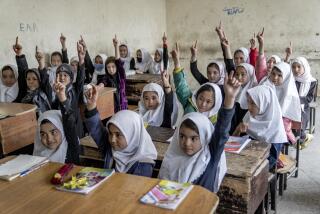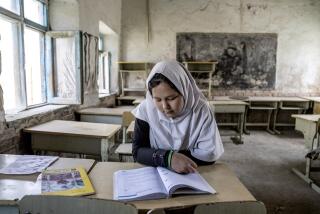Pakistani Taliban prey on youths to bolster forces
- Share via
MINGORA, PAKISTAN — The 14-year-old boy with acne dotting his chin yanked down the scarf concealing his face and recounted his 12 days in a Taliban training camp -- starting with the day six masked militants kidnapped him as he picked onions on a farm in the Swat Valley.
They blindfolded him and brought him to an abandoned girls school, he said, where he and scores of other Pakistani boys ran hills for 2 1/2 hours every day and listened to Taliban trainers extol the glory of waging holy war against the Pakistani army.
Some boys had volunteered to join the camps. Others, like the 14-year-old, dreamed of escaping.
“They were always preaching jihad and telling us it was our primary duty,” the boy said. “They said we shouldn’t let anyone hinder us. And if our parents stood in the way, we were told we could kill them.”
The youth is just one of more than a hundred boys whom the Pakistani military says the Taliban either recruited or kidnapped and held at numerous training camps. The military arranged for four of the boys to meet with reporters at a former school in Mingora, the Swat Valley’s largest city.
Pakistani military leaders say they are not sure how many boys are still with the Taliban, but that those who managed to escape returned to their parents, who notified authorities. The military said it quickly descended on the camps where the boys had been held, but the Taliban had pulled up stakes long before.
--
Facts and fiction
Pakistani commanders say they are still trying to sift through the boys’ accounts to see what holds up and what can be chalked up to exaggeration. Some of the boys have claimed that as many as 400 youths were kept at the camps, an assertion the military doubts. Other youths have said that boys as young as 7 or 8 were at the camps, a claim military officials say they cannot verify.
Still, the military believes these boys were part of a wave of recruitment by the Taliban in the early part of the year, when militants held sway over the Swat Valley in the country’s north, using kidnappings and beheadings to keep the region frozen in fear.
The Taliban continued to control Swat until May, when a military offensive began driving it out. The campaign has succeeded in clearing Swat’s urban centers and towns, though local Taliban leaders remain at large and there is sporadic fighting in rural areas.
Army Maj. Nasir Khan said many of the youths were being trained as scouts to report on the movements of Pakistani troops so militants could place roadside bombs to inflict maximum damage. Others, he said, would be trained to one day become hard-core militants.
Khan said the five boys he met with had told him they were abducted by the Taliban and taken to the camps.
Lt. Gen. Nadeem Ahmed, however, said nine youths he interviewed, all from poor families in Mingora, told him they were lured by promises of “good food and a good living.”
“They were told that whatever they wanted to do, they’d be able to do it,” he said. “That was the rallying cry -- it wasn’t about religion, it was more materialistic.”
Ahmed said the boys he spoke with became disillusioned and escaped after three weeks. He said the military was preparing counseling for the boys who went through the camps. “We’re going to treat them as rehabilitation cases, not criminal cases,” he said.
Although none of the boys interviewed said they were being trained as suicide bombers, Ahmed said the Taliban often relies on young boys to carry out such attacks, and that some among the recent wave of youth recruits could have eventually been trained as suicide bombers.
The suicide bomber who killed revered religious scholar Sarfraz Naeemi in Lahore in June was believed to be 16 or 17. A suicide attack on a Shiite Muslim prayer hall in Peshawar that killed nine people was carried out by a bomber believed to be 16, authorities said.
“Suicide attackers aren’t hard-core Taliban terrorists -- these are boys who are picked up by the Taliban and brainwashed,” Ahmed said. “These boys are just fodder for the Taliban, expendable commodities.”
Would-be suicide bombers captured by police or Pakistani troops have talked of extensive indoctrination in which Taliban militants drilled into the boys the notion that they were fulfilling a supreme religious duty, and that they should feel fortunate to have the opportunity, Ahmed said.
“They would give them all these stories about going to heaven, that this world is useless and that heaven is the real world,” Ahmed said. “And they would tell these boys, ‘You are doing a service to innocent people who die, because they will also go to heaven.’ ”
Inside a darkened, stuffy school building in Mingora commandeered by the Pakistani military, the four boys -- one 14 and the others 16 -- told of their abduction by Taliban militants in February and their eventual escape from camps deep inside dense woodlands outside the town of Matta, six miles to the north.
--
Fearing recognition
None of the boys would give their names. All wore baseball caps and scarves to mask their faces, but midway into the interview they found the scarves irritating and tugged them down.
One boy, a 16-year-old with a wisp of facial hair, said he was playing cricket with two friends in the village of Chuprial when two masked militants accosted them, accusing them of trespassing on Taliban land.
The boys were blindfolded and taken to a camp where about 150 other boys were being trained, the 16-year-old said. At his camp, he said, conditions were harsh. Food was scarce, and at times dinner amounted to a piece of flatbread shared among four boys. The recruits had to wake up before sunrise for morning prayers, then run up and down the hillsides.
Calisthenics and at times firearms demonstrations followed. In the afternoons, there were indoctrination sessions to convince the youths of the ideal of waging holy war against the military.
“We were miserable there,” the 16-year-old said. “That’s why we escaped.”
Transgressions were dealt with harshly. One boy who didn’t attend morning prayers had his face painted black. Another boy who used a splinter of tree bark to clean his teeth had his head shoved underwater and held there. He was told he was being punished because he didn’t get permission from the tree’s owner.
The 14-year-old’s first escape attempt failed. He and two other boys darted away during morning prayers, but about two hours later, militants caught up with them as they ran across a hanging bridge. Two of the boys got away, but the 14-year-old was captured and brought back.
There he was flogged with a cane. The boy said he couldn’t keep count of the lashes. “Many, many times,” he said. “It was too painful.”
Nine days later, he fled down a nearby stream to a road from which he caught a bus back to Mingora.
Not every boy at the camp, however, spent the days conjuring ways of escaping, he said.
“There were boys who were forcibly taken, but there were others who voluntarily came to the camp, and there were a lot of them,” he said. “Many of the kids were happy there. They thought it was good to be with the Taliban, and to fight jihad.”
--
More to Read
Sign up for Essential California
The most important California stories and recommendations in your inbox every morning.
You may occasionally receive promotional content from the Los Angeles Times.













